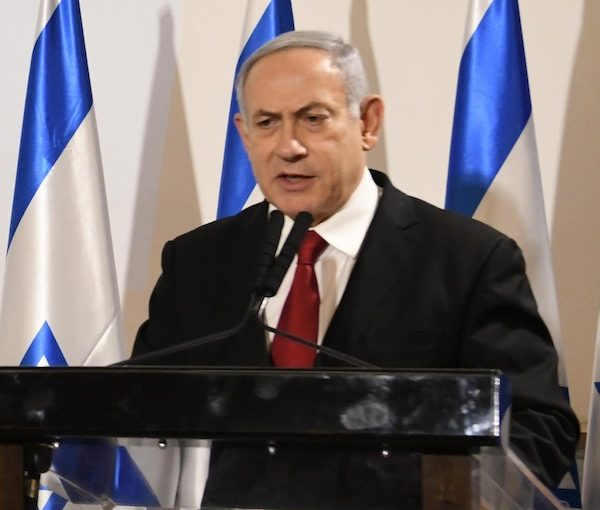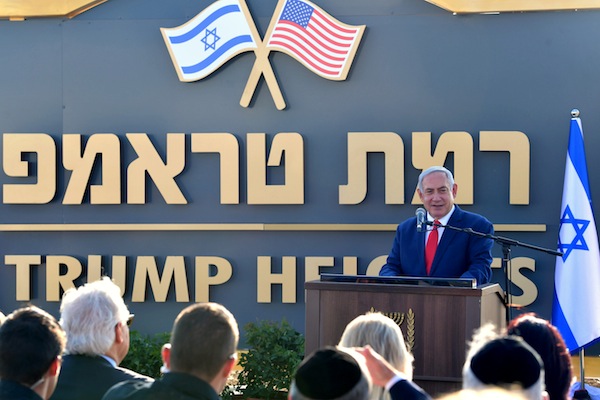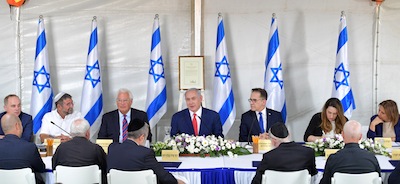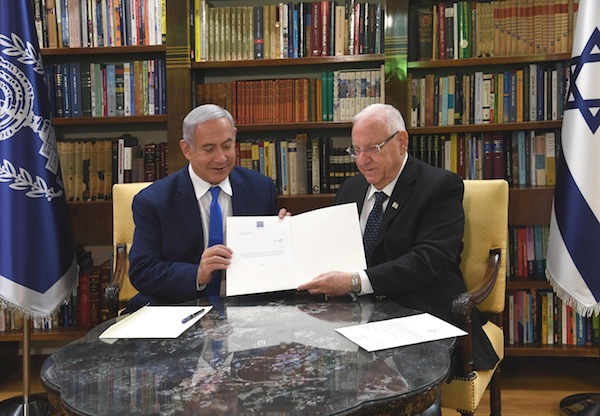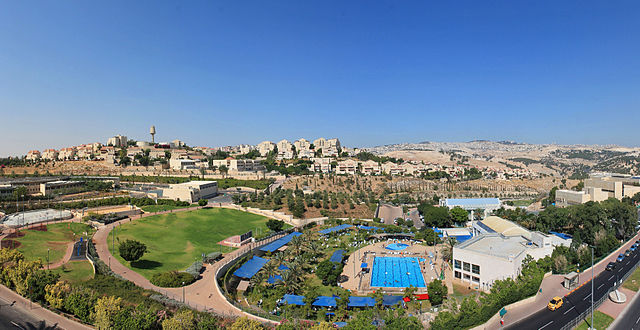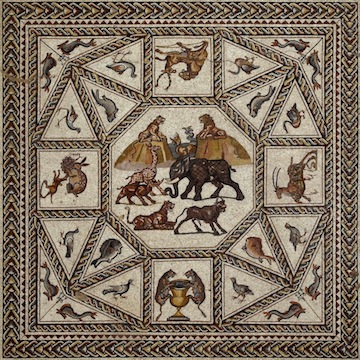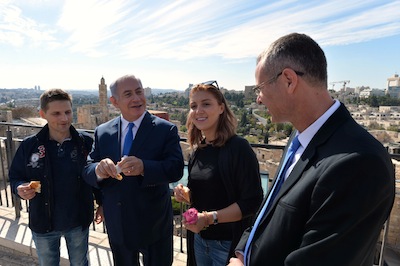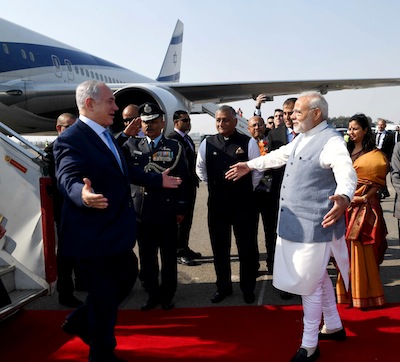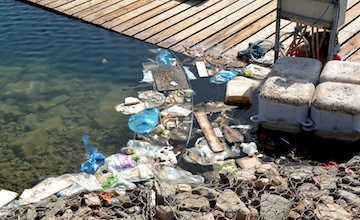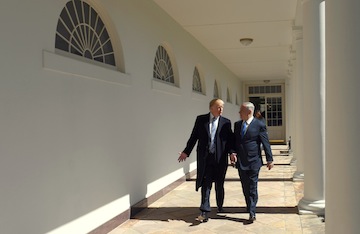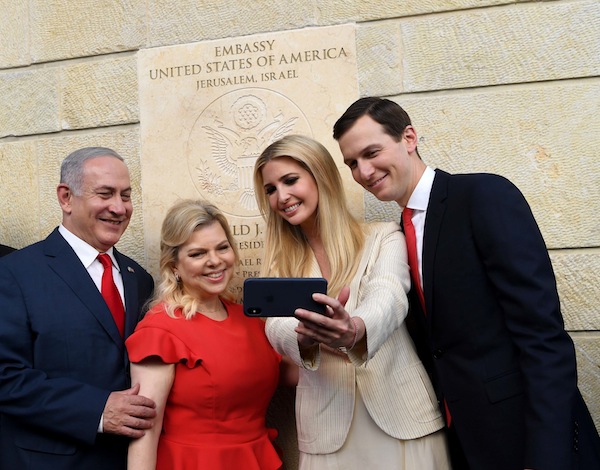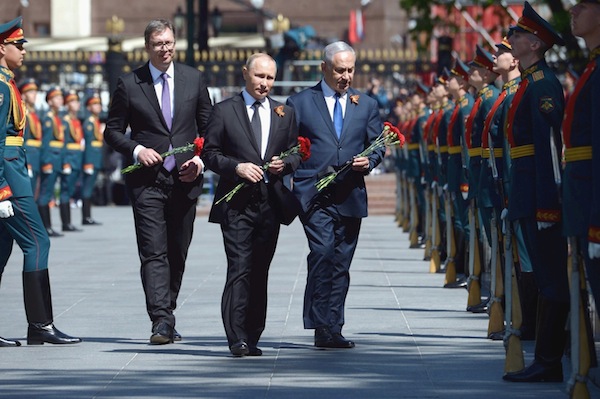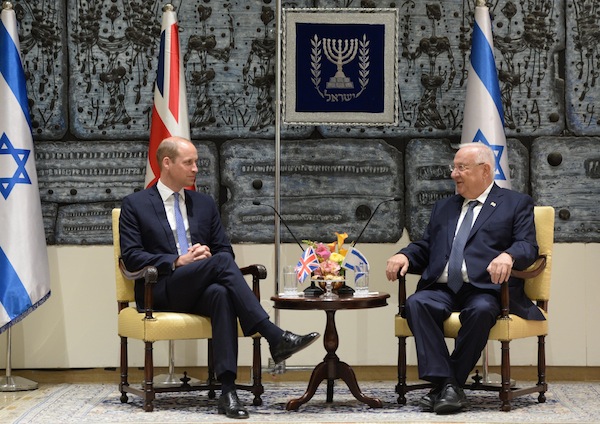Israel’s Prime Minister, Binyamin Netanyahu, addresses the General Assembly of the Jewish Federations of North America, in Tel Aviv Oct. 24. (photo by Pat Johnson)
The theme of the General Assembly of the Jewish Federations of North America in Tel Aviv was “We need to talk.” The conference was explicitly dedicated to confronting the issues that divide Jews and alienate the Diaspora from Israel. But, when the moment came to meet with the most powerful man in Israel, conference organizers folded like a house of cards.
Outgoing chair of the board of trustees of the JFNA, Richard Sandler, sat with Prime Minister Binyamin Netanyahu on a stage and performed what Haaretz rightly dismissed as a “fawning” conversation. More Oprah than interlocutor, Sandler first offered belated birthday wishes to the prime minister, then proceeded with one softball lob after another, allowing Netanyahu to control the dialogue – which he could have done more effectively if he had delivered a conventional address instead of the folksy sit-down – while Sandler offered no resistance or challenge to anything the prime minister said.
The JFNA is a non-partisan organization, of course. But the very nature of this meeting was to frankly confront the very real divisions between Jewish people in the Diaspora and those in Israel.
Here was the first question: “I’m just wondering, when you were back in high school or college, did you ever imagine someday you would be the prime minister of Israel, and would you share with us a little bit of the path from that time to what got you here?”
Even Netanyahu seemed a bit embarrassed by the question and offered assurances that he was not, in childhood or young adulthood, some Machiavellian born with his sights on the levers of power. What seasoned politician would respond to such a question with, “Yes, I’ve been planning this since I toddled”?
Next question: “I’m wondering, in all the years you’ve been doing this, how do you see the relationship between our two countries, between Israel and the United States, evolving – and what concerns you most, if anything, about that relationship today?”
“If anything”? Thousands of people had traveled from North America to Israel to address the very tangible friction points between the two Jewish communities and the inteviewer effectively invited the prime minister to assert that everything is rainbows and unicorns. And Netanyahu accepted the offering. Everything is pretty great, he contended. The trajectory of American support for Israel is increasing, he said. When he and his wife walk around Central Park or visit the Strand bookstore in Manhattan, they get warmly welcomed. The audience of 1,300 at a performance of Hamilton gave him a standing ovation. (“How did you get tickets?” heckled an audience member. “My cousin’s wife works in the production,” the PM replied.)
Then it was time for the interviewer to get tough.
“One of the things that we spoke about, Mr. Prime Minister, that we’ve been talking about the last couple of days, are all the things that we have in common,” said Sandler, moving in for the kill, “We’re having frank discussions on some of the issues that concern many North American Jews and I’m sure you are aware, as I am, that we have a number of concerns about pluralism, acceptance of Reform and Conservative Jews here in Israel, the Nation State Law and.…”
At this point, Sandler’s words were drowned out by applause from an audience who seemed to think they were finally going to get some red meat. Instead, Sandler asked, “Are we missing something? And where do we have it right?”
“I don’t think you should be concerned, but I think you should be informed,” Netanyahu responded to a room filled with the leadership of every major Jewish community in North America. “So much of this is – let me be charitable – misinformation.”
Netanyahu went on to say that, from the first prime minister on down, Israel’s leaders have managed the status quo by making modest, incremental compromises.
“We have a series of slowly evolving arrangements and that reflects the evolution of the Israeli electorate,” he said. On the issue of an egalitarian prayer space at the Western Wall, Netanyahu acknowledged a delay in the opening, but insisted his goal remains a place where women and men can pray together.
On a two-state solution, Netanyahu dismissed the terminology. “I believe that a potential solution is one in which the Palestinians have all the powers to govern themselves but not the power to threaten us,” he said. “What does that mean?”
He explained by recounting a conversation with then-U.S. vice-president Joe Biden.
“Well, Bibi,” Netanyahu said, describing the discussion, “are you for two states or are you not? I said, Joe, I don’t believe in labels.”
Netanyahu committed that Israel would retain security control west of the Jordan River, envisioning a situation where Palestinians would govern themselves but that overall security would remain in the hands of the Israeli military. This is not only good for Israel, the prime minister said, but for Palestinians, including Palestinian Authority President Mahmoud Abbas. Israel uncovered and foiled a plan by Hamas to not only overthrow Abbas, but to murder him, Netanyahu said. Without Israel’s military control in the West Bank, Hamas would swoop in, overthrow Abbas’s Fatah and Israel would have another Gaza to the east.
“They’d be overrun in two minutes,” he said.
This is all true enough, perhaps, and the first job of the prime minister of Israel is to ensure the security of his country and people. But, in acknowledging that his position would negate the possibility of an independent Palestinian state, Netanyahu reduced it to a matter of nomenclature.
“Give it any name you want,” he said. “But that’s the truth. And this truth is shared much more widely across the political spectrum than people understand, because we’re not going to imperil the life of the state for a label or for a good op-ed for six hours in the New York Times.” Like a flailing comedian, Netanyahu then turned to the audience and complained, “Nobody’s laughing.”
Sandler’s final question to the prime minister was, “What are you the most proud of about Israel today that you want us to think about when we’re going home?” And Netanyahu offered a response worthy of the question, a meandering reflection on visiting a synagogue in his family’s ancestral home of Lithuania.
As the loudspeaker was trying to advise people to remain in their seats while the prime minister’s entourage departed, Netanyahu, already standing for his farewell, interrupted to take the opportunity to tell the audience that his real concern for the Jewish people was the loss of identity. “It’s not conversion,” he said. “It’s the loss of identity.”
He warned, “Jewish survival is guaranteed in the Jewish state if we defend our state. But we have to also work at the continuity of Jewish communities in the world by developing Jewish education, the study of Hebrew and the contact of young Jews coming to Israel.”
He talked about additional funding for programs to support study-abroad programs in Israel and other things the Jewish state is doing to advance the strengthening of Jewish peoplehood.
Given the last word at the close of the three-day conference – a meeting explicitly convened to address contentious issues between the parties – Israel’s prime minister took the opportunity to school the leaders of Diaspora Jewry in how their shortcomings could imperil Jewish survival. Then he departed.

